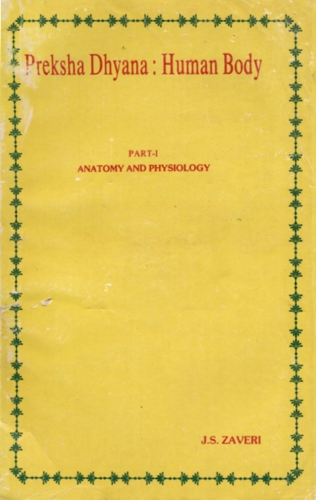Human body is one of the most exciting of nature's miracles. It is a very complex multi-cellular organism in which the survival and health depends upon proper organisation and co-ordination of a number of physiological and biochemical functions. Integrated result of these activities enable man to live happily and to maintain health. Health-care by proper co-ordination of various body-functions—breathing, eating and thinking is an important facet of the system of Preksha-dhyana.
Everybody desires and has a right to remain healthy and avoid sickness. But to remain free from disorders and diseases, we must have adequate knowledge of the various systems of the body and their mutual relationship. Strange as it may seem, though everyone lives with one's own body, each moment of one's life, one knows little about the structure of its vital organs and less about how they function. Our medical knowledge and experience has developed wonderfully well and advanced to an extent which enables us to treat and cure such dreadful diseases as typhoid and pneumonia. Our surgical techniques can now repair and even replace a faulty heart. But how many of the unfortunate millions who overcrowd the world's clinics and hospitals know which one of their body systems failed to function properly? Sure, we have developed pharmaceutical wonder drugs to treat psychosomatic diseases such as hypertension. But did any one of the thousands of hypertension victims know that it could have positively been prevented? It appears that the good old adage "Prevention is better than cure" has been very nearly removed from the book of proverbs.
Each facet of our environment affects our body and its health, sometimes obviously and directly, and sometimes far more subtly. An endless variety of health hazards, such as exhaust fumes from cars and trucks, smoke, soot and industrial dirt from the factories, vapours from oil and other noxious chemicals relentlessly threaten our health almost everyday. Stress-producing situations, such as daily commute in an overcrowded city, are built up in our daily life. Congested and badly ventilated living conditions make matters still worse, and sometime or other we are sure to become victims of the deadly effects of a pollutant or a pathogen.
Scientific and technological development has brought supersonic speeds for travelling. It has, consequently, created conditions which make unprecedented demands on our physiological organs as well as mental equipment. These conditions, however, are most unlikely to change for the better during our lifetime. We can neither fight nor run away from the problems of the modern life.
Throughout life, we are constantly at war with enemies which lurk both within and without. It is our immune system which keeps the enemy at bay and maintains homeostasis i.e. optimum conditions of health. Homeostatic mechanisms involve not only the circulatory, excretory and other body systems but also the limbic system which deals with our emotions- Disorders such as peptic ulcers, insomnia, asthma result from emotional rather than physical causes. "Psychosomatic illnesses" is the medical term for the diseases of the body resulting from mental or emotional disorder. Our thoughts and actions are influenced to some degree by emotions. Love and hate, envy, revenge - all these play an important role in our behavioural patterns. It is, therefore, necessary to maintain emotional as well as physical health. Hence for a practitioner of Preksha meditation, it is essential to know the intimate relationship between the Brain and the endocrines. The functional interlocking of the nervous and endocrine systems is so remarkable that they are regarded as constituting a single integrated system called neuro-endocrine system. The practitioner of Preksha system must also become aware that meditation can influence the control mechanisms of the body which are ultimately responsible for the homeostasis. These effects are produced by—
- A better equilibrium between the sympathetic and the parasympathetic components of the autonomic system, and
- Conditioning of the nervous region which controls the visceral functions.
Noble Laureate, Swiss Physiologist Dr. Walter demonstrated that there is an inner protective mechanism against overstress, which promotes restorative processes. In other words, everybody has the capacity to" experience relaxation and drain out one's tensions. Regular practice of easy-to-learn technique of relaxation could become a potent drug-less remedy for the most dangerous but common diseases such as hypertension.
In the following chapters each bodily system is dealt with systematically. Thus the reader will acquire good knowledge of the working of various body systems. The knowledge of our respiratory system would enable us to learn to breathe properly. Once we know how our stomach and liver operate, we shall be able to eat properly and improve our digestion. The knowledge of the functioning of our muscles would enable us to regularly relax and stop wasting nervous energy. And the knowledge of our neuro-endocrine system which has profound influence upon the mental states, emotions and behavioural patterns of an individual would enable us to remove such psychological distortions as fear, cruelty, hate, etc.
 Jethalal S. Zaveri
Jethalal S. Zaveri

